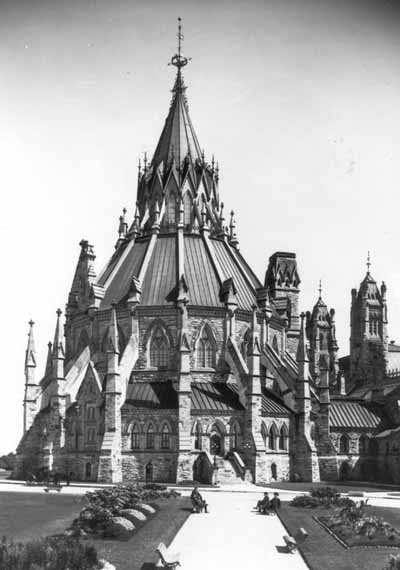Parliament Hill, Library
Classified Federal Heritage Building
Ottawa, Ontario

Façade
© Parks Canada | Parcs Canada, Catherine Beaulieu, 2010.
Address :
111 Wellington Street, Ottawa, Ontario
Recognition Statute:
Treasury Board Policy on Management of Real Property
Designation Date:
1987-05-27
Dates:
-
1859 to 1876
(Construction)
Event, Person, Organization:
-
Thomas Fuller
(Architect)
Other Name(s):
-
Library of Parliament
(Other Name)
Custodian:
Public Works and Government Services Canada
FHBRO Report Reference:
86-52
DFRP Number:
08834 00
Description of Historic Place
Inspired by the medieval chapter house, the Parliament Hill –Library is an octagonal stone building attached to the Centre Block. Designed in a highly romantic, Gothic Revival style, it is distinguished by richly coloured stonework, steep copper roof capped by iron cresting, radiating buttresses and by large pointed-arched windows that bring light into its spectacular reading room. The designation is confined to the footprint of the building.
Heritage Value
The Parliament Hill -Librarywas designated Classified because it is a national symbol of outstanding architectural and artistic merit which continues to serve its historical function in support of the operation of the Parliament of Canada.
The Parliament Hill -Library building is the best extent example of the work of Thomas Fuller, a distinguished Canadian architect. It plays a feature role in establishing the overall character of the Parliament Hill complex. In the library’s role as an archival depository, it harbours a collection that began as an initiative of Lord Simcoe, following his appointment as first Lieutenant-Governor of Upper Canada in 1791. It presently contains a rare and specialized collection of more than 600,000 volumes dealing primarily with parliamentary procedure, economies, finance, and constitutional law.
Sources:
Jacqueline Adell, Parliament Hill Complex, Ottawa, Ontario, Federal Heritage Building Review Office Building Report 86-052;Parliament Hill Complex, Ottawa, Ontario, Heritage Character Statement, 86-052.
Character-Defining Elements
Key elements that embody the heritage character of the Parliament Hill –Library include
-all of the exterior chapter house form of the Library;
-the form, surfaces and fitments of its domed reading room with radiating stacks;
-the quality of natural light in the reading room;
-its historical function in support of the operation of the Parliament of Canada.
Heritage Character Statement
Disclaimer -
The heritage character statement was developed by FHBRO to explain the reasons for the designation of a federal heritage building and what it is about the building that makes it significant (the heritage character). It is a key reference document for anyone involved in planning interventions to federal heritage buildings and is used by FHBRO in their review of interventions.
The Library of Parliament was built between 1859 and 1876 to the plans drawn
up by the architectural partnership of Thomas Fuller and Chilion Jones. In 1952-56, it underwent a process of restoration and modernization by Public Works Canada. It is under the care of Public Works Canada. See FHBRO Building Report 86-52.
Reason for Designation
On January 16, 1987, the library was designated Classified because it is a national symbol of outstanding architectural and artistic merit which continues to serve its historical function in support of the operation of the Parliament of Canada.
The library building is the best extant example of the work of Thomas Fuller, a highly distinguished Canadian architect. The structure is a unique adaptation in Canada of the medieval chapter house form. It is the only part of the original Parliament Building to survive the fire of 1916 and it plays a feature role in establishing the overall character of the Parliament Hill complex.
In its roles as an archival depository, the library habours a collection which began as an initiative of Lord Simcoe, following his appointment as first lieutenant governor of Upper Canada in 1791. It presently contains a rare and specialized collection of more than 600,000 volumes, dealing primarily with parliamentary procedure, economies, finance, and constitutional law.
Character Defining Elements
All of the exterior chapter house form of the Library and the form, surfaces and fitments of its domed reading room with radiating stacks embody its heritage character. The quality of natural light in the reading room reinforces this character. As it stands this room is a fine example of sensitive adaptation; it should continue to receive equally conscientious care.